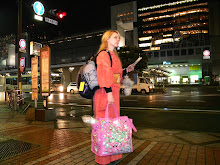
During the train ride to Xi'an, I knew exactly three and a half words of Chinese: nee-how (hello), shah-shah (thank you), ping-my-o (terra cotta warriors), and jiao (the last syllable for "dumplings").
The train ride in itself was an adventure. With a small red square of a ticket clutched in my hand, I boarded what I could only hope to be the correct train in Beijing's overwhelmingly large train station. In fact, the number of people milling about the station on an average weekday was likely three times the size of the entire population the small Ohio town in which I had been raised.
I had been advised to take a first class sleeper, which was touted as being more comfortable and generally filled by high-class Chinese business men and other foreign tourists like myself. Whether or not the amenities of first class were as luxurious as promised and the people as genteel I could not say, for in my possession was the ticket for only a hard berth, second class sleeper -- which was half the price, as well as being the only option available for purchase on the same day as I left.
I located my bunk and sat nervously (and uncomfortably) at the edge of the bed, putting the kilo of bright red wax berries I'd bought earlier that day on the bed beside me. I didn't have any specific anticipation for what a second class sleeper should entail, but they were as follows: The "rooms" without doors, just a tight pile of 6 berths (three on either side of the area) with a table and trash bin in between. There were also a number of tiny table ledges with fold-down chairs by the train windows. A number of Chinese men were already sitting at the tiny tables, smoking, chatting, and reading local newspapers. It may have been my imagination, or perhaps some combination of hypersensitivity and egoism that colors my observation, but it seemed that everyone stopped their activities, for at least the first few minutes after I made my entrance into the train car, and stared at me.
A young Chinese couple sat on the bunk across from me. We stared at each other inquisitively for a few minutes, and then I asked if they could speak English. "Yes," the young man tentatively replied, "a little." Later, I would learn his name was named Lintao, which means "wind moving through the forest."
"Hello," the girl said, in a prim though not unfriendly manner -- rather, as though repeating a dialogue learned in school -- "How are you?"
"I'm scared," I confessed. "I've never ridden by myself on an overnight train."
Whatever barriers are naturally kept between strangers then seemed to melt.
"It's ok," she said, smiling.

The young man and woman were then joined by another traveling companion, a second young man. We all shyly spoke to each other, opening up more as the train rumbled down its track. They were all from the same company, working as engineers and IT personnel in Beijing and being sent to Mongolia on an assignment. They would be on the train for 33 hours, as compared to my journey of 12 hours. We didn't do anything so exceptional on that trip, but it was nonetheless a little wonderful: We played cards (Lintao helping me with my hand, so that I could learn the game's rules by observation, which I partially, but never fully understood), they spoke to me of American sports (which the Chinese men understood far more fully than myself), I asked which cities in China were the best to visit and they took the Asian map I had with me and circled all their favorite cities, writing in the names of a few places that weren't on the map.
At one point in the night, I noticed my red waxberries had puddled out the corners of their plastic bag and leaked onto the bedsheets, a large cerise halo staining the formerly pristine linen. When the train matron discovered what happened, she yelled in a general sort of way, but I could see that she was secretly amused by the incidence, as were all my fellow passengers. After that, I shared out the waxberries with my new friends and we ate them until our fingers and mouths were stained vermillion.
When I finally bundled down to sleep a not-at-all-inconspicuous crowd of Chinese men gathered at the table nearest the foot of my bed, watching me. I am uncertain what they could have possibly gained by the spectacle of me tossing about on the bunk until my bed clothes twisted round my body like a winding sheet. Their observations could have led to nothing more profound than: Western lady finds it difficult to sleep on a hard bunk. Or the more astute may have concluded: Western lady finds it difficult to sleep on a hard bunk while five strange men are watching her.
Which brings me to the next morning. . . As I left the train station early in the golden softness of an April dawn in Eastern China, I knew exactly three words in Chinese. (I had forgotten the last half of the word for dumplings sometime in the middle of the night.) I had also, most unfortunately, lost the tiny scrap of paper -- really, a hostel advertisement -- that served as a map for Xi'an. So, I had no city map, no guidebook, no friends at that point, and only a vague idea that the terra cotta warriors were NOT AT ALL near the station. All of this would be easily enough to overcome if I would simply relent and use a taxi like other Western tourists. But, in the words belted out by Tina Turner, "[I] never, ever do things nice and easy."
I bounded up to a woman who was working at the train station. "Ping-my-oh?" I asked. She waved me to the left. I didn't really see any place to the left with the appropriate bus, so I then bounced up to the another woman who seemed local to the area. "Ping-my-oh?" The lady took me by the hand and led me to wait at an underpass where dozens of other Chinese people were also waiting, patchwork suitcases and bags of food in hand. The problem was that this area was also not a bus stop. After waiting for about 15 minutes, I approached a young, college-age man. "Ping-my-oh?," I inquired hopefully. The young man looked horrified. "No, no, no!" and he took his bag and scampered away. Hmm. Maybe I'd used the wrong intonation. I tried another woman, this time virtually cooing "ping-my-oh" to make it sound harmless as a baby. She did not know, either, but eventually located a Russian woman who gave me perfect directions to the correct bus stop.
Finally, I boarded a bus with a group of middle-aged Chinese people, most apparently on their way to work. In contrast to their bland facial expressions and serious work attire, loudspeakers filled the bus with excessively loud American club music. A dozen stops, a few dollars, and about 40 minutes later, and I arrived at the gate to one of the world's greatest historic and artistic discoveries, the beautifully detailed terra cotta warriors, the elusive ping-my-oh.





